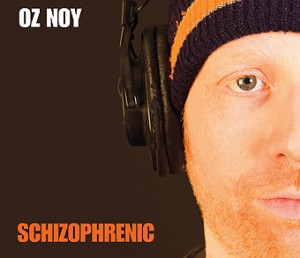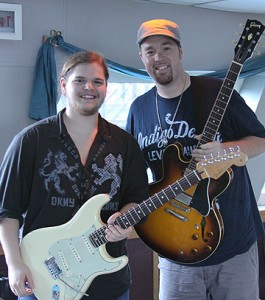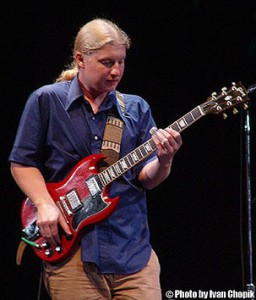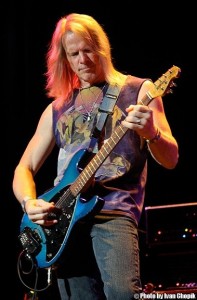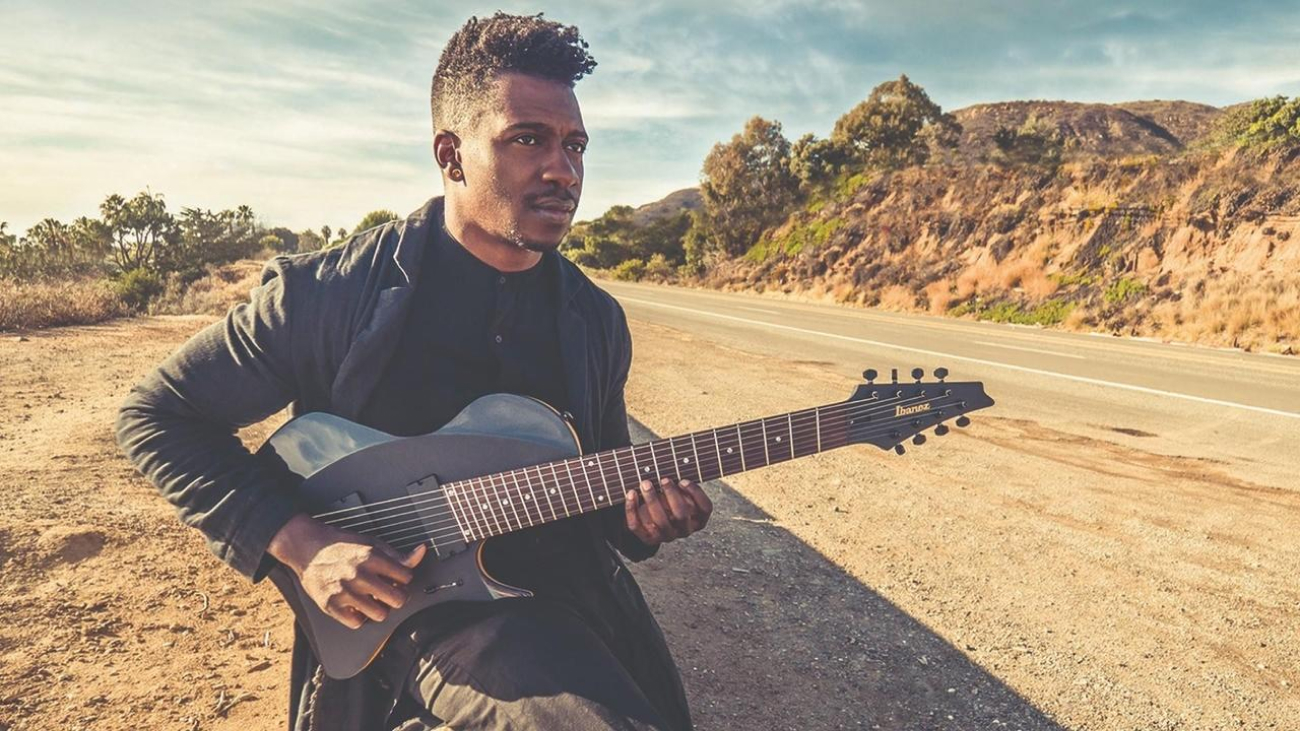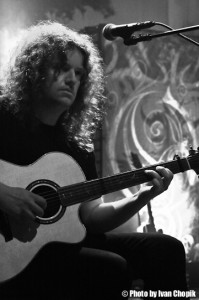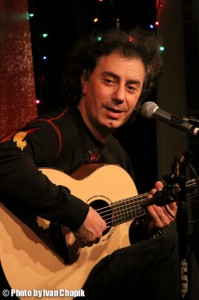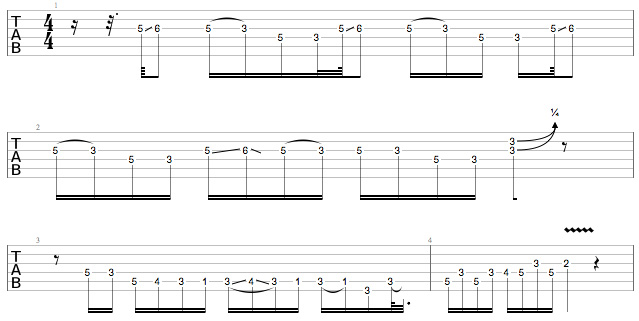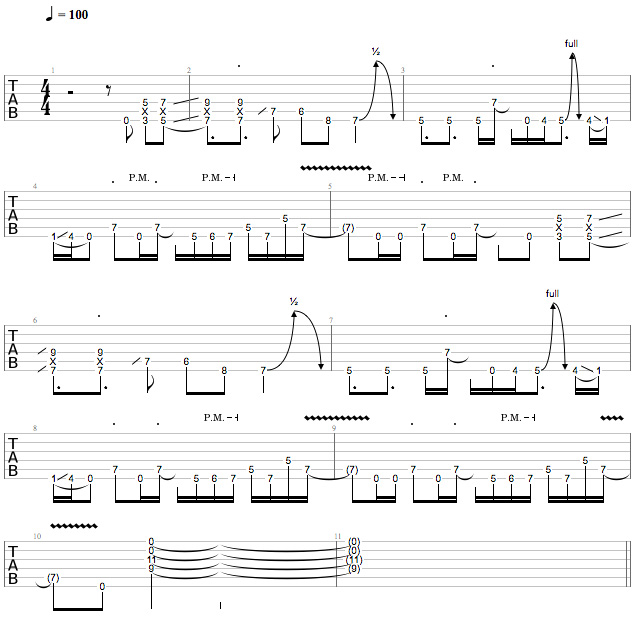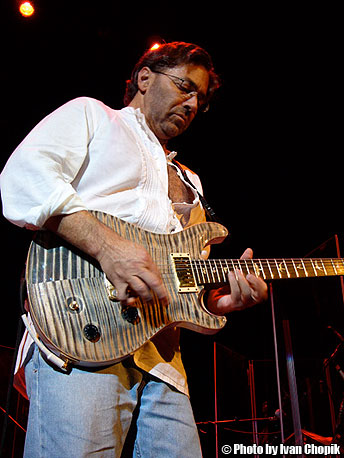 World-renowned guitar virtuoso Al Di Meola known for his eclectic mix of Latin jazz-fusion and fiery guitar lines. Over the years, he’s been named Best Jazz Guitarist in Guitar Player Magazine’s Reader Poll four times. His career first took off in 1974 during his studies at Berklee College of Music, when he was chosen to play guitar for Chick Corea’s band – Return to Forever. Besides having a productive solo career, he’s also become very well known for his collaborations with artists such as Paco de Lucía and John McLaughlin. Check out www.aldimeola.com for more information on this world-class artist and his music, as well as sound clips from his latest releases.
World-renowned guitar virtuoso Al Di Meola known for his eclectic mix of Latin jazz-fusion and fiery guitar lines. Over the years, he’s been named Best Jazz Guitarist in Guitar Player Magazine’s Reader Poll four times. His career first took off in 1974 during his studies at Berklee College of Music, when he was chosen to play guitar for Chick Corea’s band – Return to Forever. Besides having a productive solo career, he’s also become very well known for his collaborations with artists such as Paco de Lucía and John McLaughlin. Check out www.aldimeola.com for more information on this world-class artist and his music, as well as sound clips from his latest releases.
IC: What’s going on currently in the world of Al Di Meola?
ADM: Last year I put out two new records. One of them is a record called Consequence of Chaos with guests like Chick Corea, Steve Gadd, John Patitucci, and my own touring band – Gumbi Ortiz, Mario Parmisano, and Victor Miranda… and that record was kind of a return to my playing solidbody electric guitar again, even with the inclusion of a couple of acoustic pieces. And then I recently myself put out a CD, which is available on CDBaby, called Diabolic Inventions and Seduction for Solo Guitar. It’s a collection of my renditions of Astor Piazzolla’s solo guitar work (Astor being the father of classical Tango). That record is probably the newest at the moment. And then I have scheduled from March through the summer tours with my group, which will take us primarily through Europe.
IC: The new album, Consequence of Chaos, is your first electric guitar album in about ten years and it has a really fresh vibe to it. What were your inspirations this album and how would you say it differs from your previous releases?
ADM: I think my writing has evolved somewhat, so I think it’s going to be more interesting on the level of inclusions of world music elements… just new influences primarily. But also on the production side of things I get into using new gadgets and sounds that add a new modded element to the sound. So the palette becomes wider in terms of what can be used to further enhance the imagination.
IC: Your compositions combine elements of Latin music, jazz, fusion, R&B, and pop. How would you describe your style and where do you see it heading towards in the future?
ADM: Usually the future is up for grabs. In other words, it’s where your imagination can take you – where your current influences are at the very time that you hear something new that might stimulate a new direction in writing and playing. Most musicians that I admire, and I use it as the same for myself… we’re constantly on a search for the next thing or the new thing that can generate that kind of stimulation. So that’s up for grabs. Right now I just let it happen as it happens.
I’m also hoping to see a reformation of Return to Forever. Maybe next year I hope. We’re going to make another attempt at convincing Chick [Corea]… it’s mostly a wonderful thing for our fans that have been dying to see this for the last 25 years, but it’s also a whole new generation that will come out to see this kind of band. It’s a legendary group… and you see everybody else doing it – The Police, Van Halen, and then The Eagles – they were bands that basically hated one another and are all getting back together. So there’s no reason why this shouldn’t happen.
IC: You recently had several collaborations more in the pop genre, such as the album Cosmopolitan Life. Why the departure from your signature fusion sound?
ADM: Well, only because of an interesting offer you might want to say. A lot of us grew up with pop music and it is so much a part of our culture. I started, as very few of us started, with jazz when we were young. Most of us started listening to rock and pop. And it’s just very much a part of my inspirations earlier on. The offer came to do something that was completely different – out of the box. And that at the time that I was offered the possibility seemed to be more stimulating than doing the same old thing and I felt that after 20 records of my own I could afford the chance and the opportunity to do something that was far left or far right in this case, because it went down the middle.
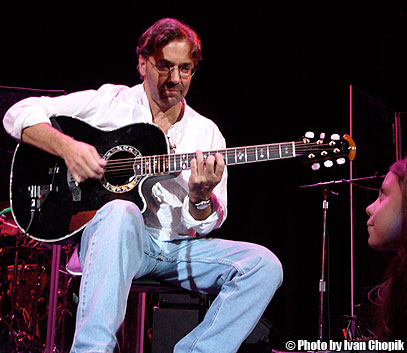
Al watching his daughter, who joined him on stage
But with Cosmopolitan Life the record in actuality and all fairness is the music of this Russian pop singer. It’s not my music. I was just actually honored, but also surprised that they would give me such credit as being an equal partnership which it really is Leonid Agutin’s record. I lent my support on some production ideas and also my playing. They wanted to give more credit than I thought I was actually due. But anyway, it was a cool thing to do.
IC: When did you attend Berklee and how long were you there? What was your major?
ADM: I was there I think from ’73 to ’74 and my major was Guitar Performance. Not a degree course, it was a diploma course. And I remember that it was a very good experience for me since most classes related to my instrument, which is what I wanted. I didn’t want to have to go into any kind of academic classes that were unrelated. So between the classes, which I got a lot out of, and the fact that there was the community of musicians mostly highly motivated in the area of music that I liked. There were plenty of jam sessions and stimulating shows in the area.
IC: What would you say is the most important thing that you took away from the whole Berklee experience?
ADM: Well, let’s see. In each category I think I took something away from the school. It was the overall sum of the interesting parts of harmony primarily. But in each category, arranging and harmony became an important ingredient in my development. It was all different kinds of classes relating to ear training and things of that nature that I haven’t gotten before that experience even though I had a guitar instructor from the age of 9 when I started. This was the next level and it afforded me the basis for being ready for the experience that I had at 19 years old playing with Chick Corea.
IC: And I’m sure that you spent a good amount of time working with all this material. As a developing guitar player, what was your practice regime like?
ADM: Well it was on Mass[achusetts] Ave in the dormitories. I shared one room with two other guitarists, so we had the three of us and my designated area for private practice was in the giant closet that was in this particular room, which was on the fourth floor, I believe. I spent I think 8 hours a day in that closet. I was really motivated let’s say… to the point of insanity.
IC: While many guitarists work on techniques used in soloing, many overlook the rhythm aspect of playing guitar. You are very proficient in both areas, so how would you suggest to approach working on rhythm chops?
ADM: Every guitarist needs to be able – needs to – be able to tap their foot in time as they play. And if they can’t, they usually have a very, very serious problem with time. Where most guitarists that I find, even at higher levels and maybe some times celebrity levels, I find that they set the time and it’s not as good as they think. And whenever they play syncopations, when asked that they tap the time you watch that their time actually goes off, because the syncopation influences their time, and they get thrown off. And even if it’s momentary, it’s still breaking that moment of fluidity. I find it to be a real hindrance because once you tap into finding if you actually have a good sense of time it opens a tremendous door for possibilities rhythmically.
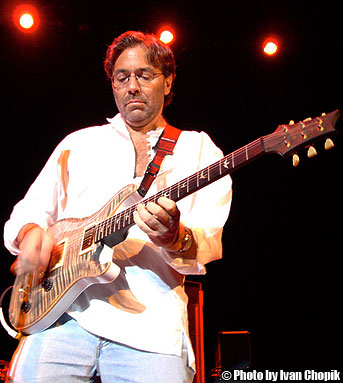 And there are players that have this naturally. Usually it comes naturally. You either have it or you don’t have it. The guitarists have to find it. And if you’re not able to tap in time you’ll have a very difficult time I find with that door opening. It’s a whole study onto itself, one of which no school is even close to, because they don’t find it to be that important. But in reality, your tapping into the rhythm aspect is probably more important than anything. You can always learn harmony, no matter who you are. You can learn all other aspects of music, but you can’t learn rhythm. Rhythm is the ability to tap into the natural aspects of time. It’s something that you either have or you don’t. There’s a path on which to find that, but right away I think guitar players have to study when they practice, they really have to focus on tapping their foot in time so that when they play their accents and their syncopations that the foot doesn’t move a hair in terms of it going out of time. And it’s a very difficult study.
And there are players that have this naturally. Usually it comes naturally. You either have it or you don’t have it. The guitarists have to find it. And if you’re not able to tap in time you’ll have a very difficult time I find with that door opening. It’s a whole study onto itself, one of which no school is even close to, because they don’t find it to be that important. But in reality, your tapping into the rhythm aspect is probably more important than anything. You can always learn harmony, no matter who you are. You can learn all other aspects of music, but you can’t learn rhythm. Rhythm is the ability to tap into the natural aspects of time. It’s something that you either have or you don’t. There’s a path on which to find that, but right away I think guitar players have to study when they practice, they really have to focus on tapping their foot in time so that when they play their accents and their syncopations that the foot doesn’t move a hair in terms of it going out of time. And it’s a very difficult study.
IC: Your technique has inspired many players to spend hours with a metronome. However, some people misinterpret speed and technique as something that prevails over the actual substance of the song. How do you respond to such comments?
ADM: My personal feeling on that comment is, (because there’s a lot of controversy on technique and speed as if they are a frivolous and self-indulgent kind of thing that overrides everything else), that it definitely is the most important thing to be able to have great technique, because if you don’t have good technique, you can’t execute what’s in your head. What good is that? So if your emotions take you to a place of a burst of energy and your technique is sloppy, that is for me the worst thing that I would want to hear in a player, because that determines the great players from the not so great players.
Now, the other aspects [of guitar playing] are also of incredible importance… if the choices of the notes are not hip, or the composition is not worthy then it all kind of adds to some effect – or defect. But it comes back to the technique – absolutely, it’s extremely important, because sloppiness is the first key that the guy doesn’t have his stuff together. I’m sorry to inform the ones that can’t do it out there. I’m even gonna piss them off more – the hammering thing and the sweeping thing is ok, but the guys that can pick that stuff are the leaders. The best players, when it comes down to it, (and I look at guys that I look up to like Chick [Corea] or some great flamenco players) have phenomenal articulation. They can actually play it, not sweep around it or hit one note and hammer-on the rest, because the actual effect is not as strong and it’s easier to do. Some can do it very artistically, mind you. Like Eddie Van Halen can do his thing the best in that realm. But the ones that impress me the most are the ones that can actually play it.
IC: It’s interesting, one of the other guitarists that also worked with Chick Corea over the years is Frank Gambale. He’s one of the masters of sweeping.
ADM: Right. Now Frank’s a great player. Don’t get me wrong, his ideas are really nice and he plays really good and everything. Now, if you were able to play pick all that stuff then what you would have is more of the same effect that I would get when I listen to somebody like Chick, who has phenomenal articulation. So I gravitate more towards articulate players, that’s all.
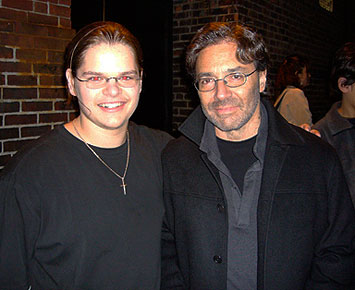
Ivan Chopik with Al Di Meola in 2007
IC: What advice can you give to aspiring musicians here at Berklee and everywhere?
ADM: Try not to make it too soon. Try to go through more semesters than I did (laughs). There’s a lot to learn at Berklee. I was almost sorry I had to leave so soon, but I had those opportunities to keep quick. But just absorb as much as you can from school and go to as many live shows as possible, because that’s where you usually learn more and inspiration drives you.
I would try to copy as best as you can the guys that influence you the most, because in the course of trying to do what they do you’ll develop to your own voice – that’s my advice. But also try to really focus on tapping your foot when you play and making sure that any accents or speed that you exhibit on the technical side of things, that it doesn’t influence the time that you’re keeping with your foot. And if that happens, then you’d have a rhythmic sickness that needs to be overcome, even if that means working with a metronome.



